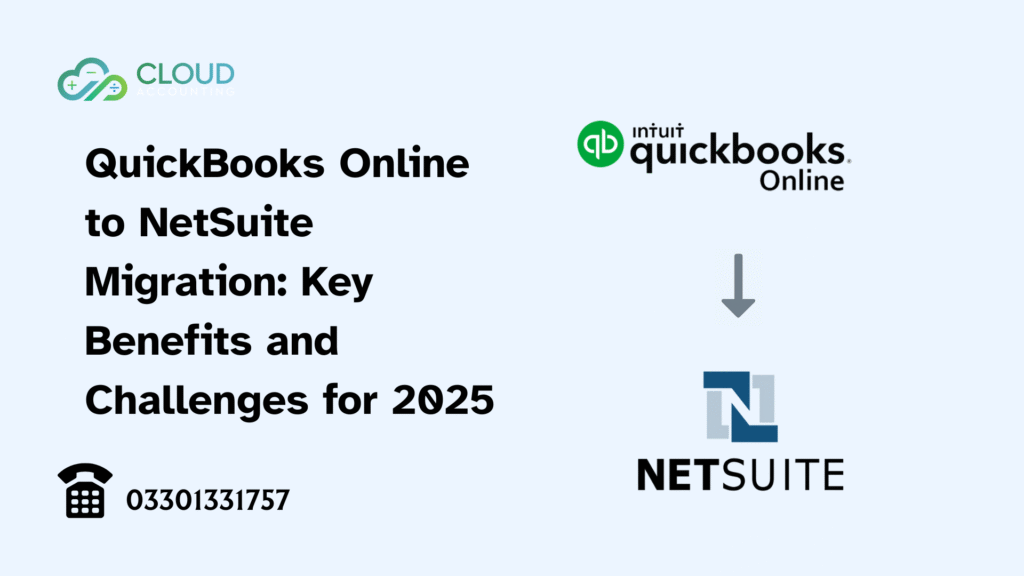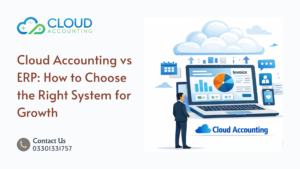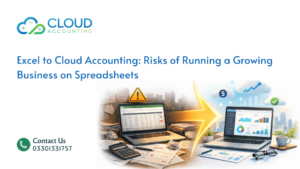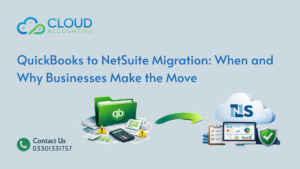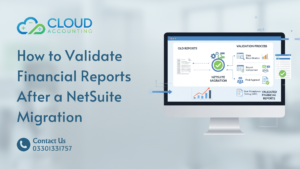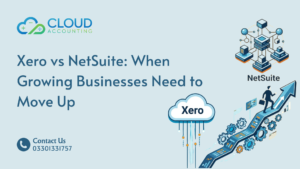Growth is exciting for any business, but it often exposes the limits of the tools you started with. Many companies begin with QuickBooks Online because it’s affordable, user-friendly, and covers basic accounting needs. Yet as operations expand, finance leaders quickly realise the system can’t keep up with the demands of multi-entity accounting, advanced reporting, or complex integrations. That’s when QuickBooks Online to NetSuite Migration becomes more than a technical project — it becomes a strategic move for long-term success.
QuickBooks Online was built for small to medium businesses, and it does that job well. But once you reach a certain stage of growth, you may find that:
- Consolidating multiple subsidiaries or entities takes too much time.
- Your finance team spends hours building reports manually.
- Integrations with your eCommerce, CRM, or payroll systems feel fragile.
- You’re struggling to get a clear financial picture across different regions.
These challenges are common, and they’re also clear signals that it’s time to evaluate NetSuite. Unlike QuickBooks, NetSuite is designed for scale. It’s a true ERP system that handles complex requirements without slowing your finance team down. That’s why more and more companies are considering a QuickBooks Online to NetSuite Migration in 2025.
When businesses weigh up NetSuite vs QuickBooks Online, the differences are striking. NetSuite offers powerful automation, real-time dashboards, and the flexibility to support global growth. For decision-makers, the real question isn’t whether to migrate — it’s how to do it efficiently and with minimal risk. That’s where our expertise at Cloud Accounting makes the difference.
In this guide, we’ll cover why QuickBooks users upgrade, the benefits of NetSuite, the challenges of migrating, and the tailored solutions we provide. If you’ve been wondering whether a move is right for your business, you’re in the right place.
Why QuickBooks Users Upgrade to NetSuite
Many small businesses thrive on QuickBooks Online in their early years. It’s easy to set up, cost-effective, and delivers the essentials. But once growth kicks in, limitations start to show. Finance leaders soon realise that scaling a business requires more than spreadsheets and workarounds. That’s why an increasing number of companies are considering QuickBooks Online to NetSuite Migration.
QuickBooks works well for straightforward bookkeeping, but as organisations expand, they need more depth and flexibility. This is where frustrations begin:
- Reporting bottlenecks: Management teams want real-time visibility, but QuickBooks often forces manual exports and reconciliations.
- Multi-entity struggles: Growing businesses with multiple subsidiaries face painful consolidation processes.
- Limited integrations: Connecting eCommerce platforms, CRMs, and payroll tools often leads to fragile setups.
- Compliance risks: International operations introduce VAT, tax, and audit challenges that QuickBooks wasn’t designed to handle.
These are more than minor annoyances — they are roadblocks to growth. At this stage, finance leaders start asking whether their current setup is holding the business back. That’s where the idea of a QuickBooks Online to NetSuite Migration gains real traction.
Triggers That Push QuickBooks Users to Upgrade
- Scaling beyond small business – QuickBooks is designed for SMEs, not enterprises with multiple divisions.
- International expansion – NetSuite supports global tax rules, currencies, and multi-language reporting.
- Demand for automation – Businesses want to reduce manual accounting tasks and speed up monthly closes.
- Investor and board pressure – Stakeholders expect accurate, timely reporting and scalable systems.
When these triggers pile up, companies recognise that staying with QuickBooks limits their ability to grow. Choosing NetSuite is not just about upgrading software; it’s about adopting a platform that matches the complexity of their operations.
Why NetSuite Stands Out
For finance leaders comparing NetSuite vs QuickBooks Online, the difference lies in scope. NetSuite is a true ERP system — built to unify accounting, reporting, inventory, and business management. QuickBooks, by contrast, is primarily a bookkeeping tool. That’s why businesses looking for scalability and control see QuickBooks Online to NetSuite Migration as a natural next step.
NetSuite offers:
- Consolidated financials across entities in seconds.
- Real-time dashboards for executives and department heads.
- Built-in compliance tools for tax and audit readiness.
- Flexible integrations with leading business apps.
These advantages aren’t optional for growing organisations — they’re essential. The companies that make the move early gain an edge, because they avoid the inefficiencies and risks that come with pushing QuickBooks beyond its intended limits.
Ultimately, QuickBooks Online to NetSuite Migration is a response to growth. Businesses aren’t leaving QuickBooks because it failed them; they’re moving on because their ambitions demand a system built for scale.
Benefits of NetSuite Over QuickBooks Online
Upgrading accounting systems isn’t just about switching tools — it’s about unlocking capabilities that support sustainable growth. Businesses that choose QuickBooks Online to NetSuite Migration aren’t simply replacing software; they’re stepping into a more powerful platform that removes bottlenecks and enables smarter decision-making.
QuickBooks Online was never designed to handle enterprise-level complexity. NetSuite, on the other hand, is a full ERP solution trusted by global businesses. When finance leaders compare NetSuite vs QuickBooks Online, the differences quickly become clear.
1. Scalability That Matches Business Growth
QuickBooks is ideal for startups and small businesses, but it struggles when multiple entities, currencies, or regions are introduced. NetSuite is designed to scale with your operations, no matter how complex they become.
With QuickBooks Online to NetSuite Migration, companies gain the ability to:
- Manage unlimited entities in one centralised system.
- Consolidate financials instantly across subsidiaries.
- Expand globally with multi-currency and multi-language support.
- Adapt workflows to new business lines or acquisitions.
This scalability ensures businesses don’t need another upgrade later — NetSuite grows with them.
2. Advanced Reporting and Real-Time Insights
In QuickBooks, producing advanced reports often requires manual exports and Excel workarounds. For a growing company, this becomes unsustainable. NetSuite provides real-time dashboards and advanced analytics that empower leadership teams to act fast.
Key advantages include:
- Customisable KPIs for executives and department heads.
- Drill-down reports from consolidated to transactional levels.
- Instant visibility into profitability, cash flow, and performance metrics.
- Automated reporting schedules that reduce month-end closing time.
This level of visibility is one of the top reasons companies pursue QuickBooks Online to NetSuite Migration.
3. Multi-Entity and Global Capabilities
For businesses managing multiple subsidiaries, QuickBooks requires time-consuming workarounds. NetSuite was built to solve this challenge. Its native multi-entity features allow CFOs to view consolidated results without endless reconciliations.
Benefits include:
- Real-time consolidation across entities.
- Intercompany eliminations handled automatically.
- Global compliance with country-specific tax and reporting rules.
- Unified view of international operations.
The leap from QuickBooks to NetSuite is particularly significant for organisations expanding internationally. That’s why QuickBooks Online to NetSuite Migration is often the turning point for companies going global.
4. Seamless Integrations and Automation
Modern businesses rely on multiple systems from eCommerce platforms like Shopify to CRMs like Salesforce. QuickBooks offers some integrations, but many lack depth and reliability. NetSuite delivers robust APIs and pre-built connectors that make integration smoother and more dependable.
With QuickBooks Online to NetSuite Migration, businesses unlock:
- Reliable integrations with eCommerce, CRM, and payroll systems.
- Automated data syncing to reduce manual entry.
- End-to-end workflows connecting finance with operations.
- Enhanced audit trails for compliance.
The result is less time managing systems and more time driving strategy.
5. Compliance and Audit Readiness
QuickBooks wasn’t built with complex compliance requirements in mind. For companies operating in regulated industries or across borders, this creates risk. NetSuite provides built-in compliance features that ensure accuracy and reduce audit stress.
Compliance benefits of NetSuite include:
- Configurable tax engines for different jurisdictions.
- Audit-ready reports available on demand.
- Strong role-based security controls.
- Documentation trails that satisfy investor and regulator expectations.
This is why QuickBooks Online to NetSuite Migration is often driven by CFOs and audit committees.
Why Businesses Choose Cloud Accounting for the Switch
While the benefits are clear, making the move requires expertise. Cloud Accounting specialises in managing the complexities of QuickBooks Online to NetSuite Migration, ensuring accuracy, compliance, and minimal disruption.
We support businesses by:
- Mapping data from QuickBooks to NetSuite accurately.
- Configuring NetSuite to match unique business processes.
- Testing integrations before go-live.
- Training staff for long-term adoption.
When companies see the full benefits of NetSuite, the value of migrating becomes undeniable.
Challenges in QuickBooks Online to NetSuite Migration
The benefits of NetSuite are undeniable, but the journey to get there isn’t without hurdles. A QuickBooks Online to NetSuite Migration is a major project that touches every part of your finance operations. Without proper planning, companies risk delays, data inaccuracies, or disruptions to daily business. Understanding these challenges upfront is the first step toward overcoming them.
1. Multi-Entity Consolidation Complexities
One of the most common triggers for QuickBooks Online to NetSuite Migration is the need for multi-entity accounting. Unfortunately, this is also one of the toughest challenges during migration. QuickBooks data structures don’t always align neatly with NetSuite’s entity-based design.
Key issues include:
- Mapping multiple subsidiaries into NetSuite’s global consolidation framework.
- Aligning intercompany transactions for accurate eliminations.
- Ensuring that historic data reflects true consolidated performance.
For companies already struggling with manual consolidation, this stage of migration can feel overwhelming.
2. Reporting and Data Structure Differences
QuickBooks and NetSuite don’t “think” about reporting the same way. In QuickBooks, reports are often flat and basic, while NetSuite’s reporting is multidimensional and highly customisable. During a QuickBooks Online to NetSuite Migration, businesses must carefully translate existing reports into NetSuite’s framework.
Challenges often include:
- Converting custom QuickBooks reports into NetSuite saved searches and dashboards.
- Deciding what historical data to migrate vs. archive.
- Training teams to build and interpret reports in a new environment.
This can slow adoption if not addressed early.
3. Integration Reconfiguration
Modern companies rarely operate on accounting software alone. They rely on eCommerce platforms, CRMs, payroll tools, and industry-specific apps. Migrating means those connections must be rebuilt.
During QuickBooks Online to NetSuite Migration, common integration challenges include:
- Reconnecting Shopify, Salesforce, or payroll systems to NetSuite.
- Managing differences in API structures and data fields.
- Avoiding duplicate entries or data sync failures during go-live.
- Ensuring third-party connectors are tested thoroughly.
Without expertise, businesses risk losing critical data flows that keep operations running.
4. Historical Data Migration
Data is the backbone of accounting, but moving it isn’t straightforward. QuickBooks allows for years of historical invoices, bills, and journals. NetSuite, however, requires strict formatting for imported records.
Challenges businesses face include:
- Cleaning duplicate or inconsistent records before import.
- Deciding whether to migrate detailed transaction history or just summaries.
- Ensuring tax codes and compliance details carry over correctly.
- Preventing data loss during bulk uploads.
This step is one of the most labour-intensive parts of QuickBooks Online to NetSuite Migration.
5. User Adoption and Training
Even after data and integrations are complete, another challenge remains: people. Finance teams used to QuickBooks may find NetSuite overwhelming at first. The user interface, workflows, and reporting structure require training and change management.
Barriers to adoption include:
- Resistance from employees comfortable with QuickBooks.
- Steep learning curve in using advanced NetSuite features.
- Need for new internal processes to replace old QuickBooks workarounds.
Without strong onboarding, businesses risk underutilising their new system.
6. Project Management and Costs
A QuickBooks Online to NetSuite Migration is more than a technical job it’s a full-scale project. Companies often underestimate the time, budget, and expertise required. Common pitfalls include:
- Incomplete project planning.
- Underestimating resource requirements.
- Scope creep as more features are added mid-project.
- Cost overruns from delays or rework.
This is why experienced partners are critical for guiding the process.
Turning Challenges into Opportunities
While these hurdles are real, they’re not insurmountable. In fact, businesses that anticipate challenges often come out stronger after migration. By preparing for obstacles like reporting differences, data complexity, and user adoption, companies ensure their QuickBooks Online to NetSuite Migration sets them up for long-term success.
Cloud Accounting helps businesses turn challenges into opportunities by:
- Running a detailed pre-migration audit.
- Cleaning and structuring data before upload.
- Testing integrations thoroughly before go-live.
- Delivering hands-on training for finance teams.
Every challenge is manageable with the right strategy and support — and the payoff of a successful migration far outweighs the initial hurdles.
How Cloud Accounting Solves Migration Challenges
Migrating from QuickBooks to NetSuite may look daunting, but with the right partner, those challenges become opportunities for growth. At Cloud Accounting, we specialise in QuickBooks Online to NetSuite Migration, guiding businesses through every stage with precision and care. Our structured approach ensures that no detail is overlooked and that finance teams can focus on strategy, not firefighting.
Step 1: Comprehensive Pre-Migration Audit
Every successful project starts with understanding the current environment. Before we begin, our team conducts a detailed audit of your QuickBooks setup.
This includes:
- Reviewing your chart of accounts, customer records, and vendor data.
- Identifying duplicate, missing, or inconsistent records.
- Pinpointing integrations that need reconfiguration.
- Highlighting potential compliance issues before they become risks.
By doing this upfront, businesses enter QuickBooks Online to NetSuite Migration with a clear roadmap.
Step 2: Accurate Data Mapping and Conversion
One of the biggest fears in migration is losing or corrupting data. Our specialists handle this with strict mapping protocols that ensure everything transfers correctly.
We focus on:
- Aligning QuickBooks data fields with NetSuite’s structures.
- Carrying over historical transactions where needed.
- Preserving tax codes and audit trails for compliance.
- Running test imports to validate accuracy before go-live.
This careful approach to QuickBooks data conversion means finance teams can trust the numbers from day one.
Step 3: Integration Reconfiguration
Most modern businesses depend on apps like Shopify, Salesforce, or payroll systems. During QuickBooks Online to NetSuite Migration, we rebuild these connections inside NetSuite so workflows continue without disruption.
Benefits of our integration support:
- Reconnecting mission-critical apps quickly.
- Ensuring clean data flow between systems.
- Customising integrations to match business processes.
- Testing every connection before the system goes live.
This ensures operations run smoothly across departments.
Step 4: Staff Training and Change Management
Even the best system is only as effective as the people using it. That’s why training is a cornerstone of our migration service. We provide hands-on sessions tailored to your finance team and key stakeholders.
Training covers:
- Navigating NetSuite’s interface with confidence.
- Building reports and dashboards to replace QuickBooks outputs.
- Understanding new workflows for approvals, billing, and reporting.
- Ongoing support channels for post-migration questions.
This empowers your team to fully leverage NetSuite’s capabilities.
Step 5: Ongoing Support and Optimisation
Our role doesn’t end once the system is live. Post-migration, we provide continuous support to fine-tune your NetSuite environment. Whether it’s configuring new reports, adding automation, or preparing for audits, we’re here to help.
This commitment means businesses don’t just complete a QuickBooks Online to NetSuite Migration they achieve long-term success with their new ERP system.
Why Choose Cloud Accounting?
Partnering with us gives you peace of mind. We’ve helped businesses across industries move beyond the limitations of QuickBooks, unlocking the scalability of NetSuite. With our blend of accounting expertise and technical know-how, your migration is in safe hands.
Case Study: A Business That Made the Switch
To see the impact of a QuickBooks Online to NetSuite Migration, let’s look at one of our clients: a fast-growing eCommerce retailer.
They had started on QuickBooks Online when revenues were modest, but within five years they had expanded into three countries and launched multiple sales channels. QuickBooks simply couldn’t keep up.
- Consolidating results from three entities took nearly two weeks each month.
- Reporting was slow, with managers relying on outdated spreadsheets.
- Integrations with Shopify and their CRM kept breaking, leading to lost data.
Cloud Accounting stepped in to guide their QuickBooks Online to NetSuite Migration. We ran a pre-migration audit, mapped their data, and rebuilt their integrations inside NetSuite. Within two months of go-live, they were:
- Closing the books in three days instead of two weeks.
- Delivering real-time dashboards to department heads.
- Running reliable Shopify-to-NetSuite integrations without manual work.
The shift was transformative. Today, they continue to grow without worrying about whether their finance system can keep up. Their QuickBooks Online to NetSuite Migration became the foundation for scaling globally.
Conclusion: Is It Time for Your Migration?
For many businesses, QuickBooks Online is the right starting point. But once growth accelerates, its limitations become roadblocks. That’s when a QuickBooks Online to NetSuite Migration makes sense.
The benefits are clear:
- Scalable multi-entity accounting.
- Advanced reporting and real-time insights.
- Stronger integrations and automation.
- Built-in compliance and audit readiness.
Of course, challenges like data conversion, integrations, and training exist. But with Cloud Accounting as your migration partner, those challenges turn into opportunities to build a stronger finance foundation.
We’ve guided businesses across industries through QuickBooks Online to NetSuite Migration, helping them avoid pitfalls and unlock the full potential of NetSuite. From cleaning historical data to training your finance team, our end-to-end process ensures your system is ready for long-term success.
If you’ve outgrown QuickBooks and are wondering whether now is the right time, the answer may be yes. NetSuite is not just an upgrade it’s a platform that future-proofs your business.
Ready to explore your options? Book a free consultation with Cloud Accounting today. Let’s discuss how a tailored QuickBooks Online to NetSuite Migration can set your business up for the next stage of growth.

